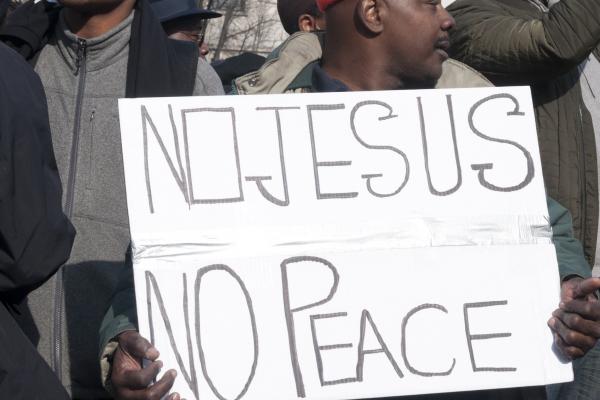“Excuse my ignorance, I thought I was a free black man.”
“I’m 11 [years old], I matter.”
“You can choose to look away, but never again can you say you didn’t know.”
“How many times do we have to protest the same [s**t]?”
“White silence is white violence.”
“We have nothing to lose but our chains.”
These signs, and many others, lined the horizon of Pennsylvania Avenue on Saturday in Washington, D.C. In a ‘Justice for All’ march organized by Al Sharpton and the National Action Network, thousands of protesters gathered to protest police actions that have resulted in the deaths of unarmed young black men across the United States.
After marching from Freedom Plaza to the U.S. Capitol, protesters listened to speakers from national racial justice organizations address some of these most recent acts of police brutality.
Al Sharpton sought to draw attention to the diversity present on the streets.
“This is not a black march or a white march. This is an American march for American rights,” he said.
Indeed, the black community was not alone in speaking up against police brutality. One Latina activist encouraged her Latino brothers and sisters to “voice their pain” from police harassment and “come forth and unify with the African American community so we can be strong together.”
“¡Ya Basta!” she concluded. [“Enough is enough!”]
Victims’ Families Speak Out
The families of Michael Brown, Eric Garner, Tamir Rice, Trayvon Martin, and other recent victims of police brutality also joined the protest.
As Sharpton introduced these families, the crowd grew quiet. An atmosphere of anger and protest quickly turned to one of anger and lament – although many in the crowd had personally encountered police racism, the men, women, and children on the stage represented the wounded soul of a growing national movement against police brutality.
Just one day after the autopsy of Tamir Rice was released, which declared his death a homicide, Tamir’s mother, Samaria Rice, struggled for words at the podium. Struck by the number of protesters in the streets, she thanked the nation for their support.
“That’s the only way I’m standing,” she said.
She reminded the crowd that the issue of police brutality does not only affect young men.
“Please don’t shoot. I want to grow up, too,” she concluded.
Eric Garner’s wife, Esaw Garner, was also encouraged by the protesters. In them, she saw new life for her husband.
“My husband was a quiet man, but he’s makin’ a lot of noise now!” she said.
John Crawford Jr., the father of John Crawford III, the boy who was killed for handling a toy gun in a Walmart, drew attention to the race discrepancies in our political system.
“When you don’t have balance on the inside, you’re not going to have balance on the outside,” he said.
Kadiatou Diallo, the mother of Amadou Diallo, also spoke at the march. In 1999, Amadou, 23, was approached by police after they mistook him for a rape suspect. When police asked for his wallet and Amadou showed it to them, police thought the wallet was a gun and killed Amadou, firing 41 bullets.
In a frightening reminder of the immutability of America’s criminal justice system, Amadou’s mother held up a Time magazine cover from 2000 with a story on “Cops, Brutality, and Race” after the Amadou’s killers were acquitted. Her story is a reminder that this national conversation will not necessarily change the system – and proof that this national conversation needs support.
Trayvon Martin’s mother, Sybrina Fulton, also stressed that this isn’t a new issue.
“This has been goin’ on,” she said. “But some folks just woke up.”
Recognizing many protesters were on the streets for the first time, she pleaded with people not to “just come to the rally and go home”, instead challenging everyone to have awkward, educational conversations with their friends and neighbors.
More Than Police Reform
Some speakers drew attention to the connected nature of various forms of oppression. One speaker emphasized police reform is not the end of the issue:
“We’re spending a lot of time on police reform, which we absolutely should. But … those very same communities ask for better housing. Those very same communities ask for better jobs. Those very same communities ask for a better school system … Why can we only hear one cry, but we can’t hear the cry of all of it? … We not gonna talk about one institution. We’re gonna talk about all institutions.”
Cornel Williams Brooks, president of the NAACP, vowed to keep the conversation going.
“We will march until hell freezes over. And when it does, we will march on the ice,” he declared.
Toni Sanders, founder of local organization Think Moor, echoed this sentiment.
“In D.C., we don’t say ‘hands up, don’t shoot.’ We already tried that. That didn’t work. We say, ‘fists up, fight back,’” Sanders said.
In this fighting spirit, many young protesters, joined by local organizers from Ferguson, carried the momentum of the march into the night. Whether that meant shutting down intersections, foot traffic in Chinatown, or a showing of Exodus: Gods and Kings, protesters were determined to make sure everyone in Washington, and throughout in the United States, understands: Black lives matter.
Ryan Stewart is Online Assistant for Sojourners.
Got something to say about what you're reading? We value your feedback!
